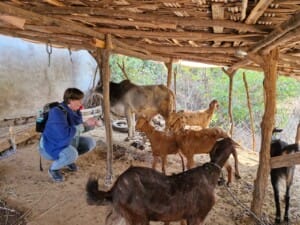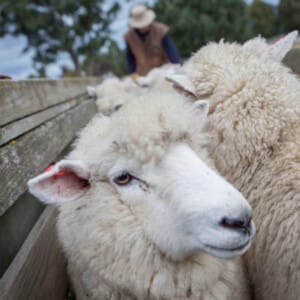
Back in 2016, while attending a conference in Salt Lake City as a master’s student, Caeli Richardson presented one of the few posters focused on methane emissions in agriculture – a niche topic at the time. Fast forward to today, and nearly every animal science conference she attends features multiple sessions dedicated to reducing environmental impact and improving sustainability. The conversation has evolved dramatically.
Caeli is a geneticist at AbacusBio, based in Edinburgh. Her work focuses on promoting genetics as a practical and cost-effective strategy for reducing greenhouse gas emissions. A key part of this involves advocating for the inclusion of genetic variation in methane emissions within carbon calculators. By integrating this variable into carbon accounting platforms, farmers can be recognised and rewarded for the genetic progress they achieve.
How is AbacusBio contributing to carbon calculator development?
AbacusBio is working to ensure that genetics is accurately represented in carbon calculators, particularly in calculating methane emissions from ruminants. This would allow farmers to account for genetic variability between animals and be incentivised for using genetic selection as a mitigation strategy – without compromising overall productivity.
Currently, carbon calculators estimate farm methane emissions based on factors like stock numbers, feed programmes, milk production, pasture management, slurry spreading, machinery use, and transportation. However, they do not account for individual animal differences in methane production potential. Methane output based on feed intake can vary by up to 30% – presenting a significant opportunity for genetic selection. Over time, this could enable the breeding of animals with lower average emissions.
How is AbacusBio implementing this approach?
AbacusBio uses genomic breeding tests to identify alleles and genes in an animal’s DNA that influence traits such as methane production. The outcome is a genomic breeding value – a genetic score that helps farmers select animals that are both productive and environmentally friendly. To integrate this data into carbon calculators, AbacusBio is developing clear, scientifically robust guidelines to ensure the process is straightforward and accessible for farmers and the wider industry.
Who are AbacusBio’s partners in this work?
AbacusBio collaborates with several organisations, including:
- Beef + Lamb NZ’s Cool Sheep Programme
- DairyNZ
- New Zealand’s Ministry for Primary Industries
- Global Methane Genetic
- Lactanet Canada
- Semex Canada
What’s unique about the Cool Sheep Programme?
Sheep are tested for methane emissions using Portable Accumulation Chambers (PACs) – special trailers where each sheep spends around 40 minutes in a clear chamber while its breath is measured. These results are combined with DNA testing to identify which sheep naturally produce less methane. Farmers can then use this information to breed more environmentally friendly, yet still productive, animals.
What challenges exist in incorporating breeding values into carbon calculators?
One major challenge is communication. Genomics is still a relatively new field, and many of its principles are unfamiliar to the broader agricultural community. Unlike feed additives, which can be tested with control groups, genetic selection lacks straightforward experimental comparisons. Instead, we rely on identifying genes that influence methane emissions and observing differences over time through divergent breeding lines – a process that takes years.
While this approach has been successful for traits like milk production, applying it to methane emissions is more complex and costly. A key question remains: how can we measure methane emissions on commercial farms?
Introducing methane emission values into carbon calculators and national inventories is a promising solution. It allows farmers to be recognised and incentivised – even in regions with emissions-related taxes. However, in an industry with tight margins, farmers need assurance that selecting for lower methane traits won’t compromise profitability. As carbon calculators become more accurate in accounting for genetics, farmers will have better tools to make informed decisions.
Has there been resistance from the agricultural industry?
No – quite the opposite. The challenge lies in communicating the impact of genetics and genetic selection on methane emissions. Because genetics is not yet widely understood, some worry about greenwashing. As geneticists, our role is to demonstrate that genetic selection for lower methane emissions is scientifically valid and not just a marketing tactic.
Which countries are leading in this space?
New Zealand, Canada and Ireland are at the forefront of integrating genetics into methane reduction strategies.
What’s happening globally?
Several international projects are underway to share data and develop tools that help farmers reduce methane emissions. These include:
- Net-Zero Dairy Genome Project (University of Guelph)
- Global Methane Genetics (Wageningen University & Research)
- Re-Livestock Project under the Joint NZ/IRE Roadmap for Methane Reduction (supported by Ministry for Primary Industries (NZ) and Department of Agriculture, Food and the Marine (Ireland))
What’s needed to make genetic variation a standard part of carbon calculators?
In an ideal world, selecting animals with lower methane emissions would be common practice. One of the biggest hurdles is the lack of unity across stakeholders, which leads to inconsistent methods and targets. For example, different markets focus on methane yield, methane intensity or gross methane – all of which need to be validated within carbon calculators to avoid skewed data.
To move forward, we need harmonisation across countries and industries. This includes:
- Agreed protocols for including methane emissions in calculators
- Consensus on which traits should be measured
- A unified global approach
Once established, this data can be submitted to the International Committee of Animal Recording – paving the way for global adoption.

You can reach Caeli at crichardson@abacusbio.com.



